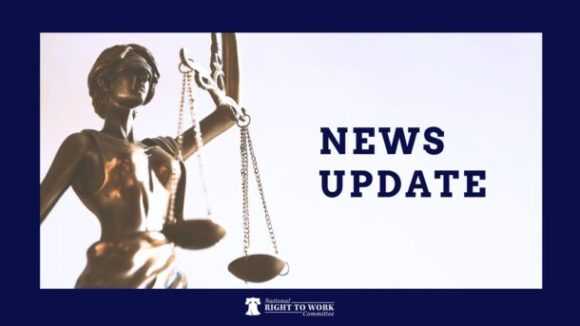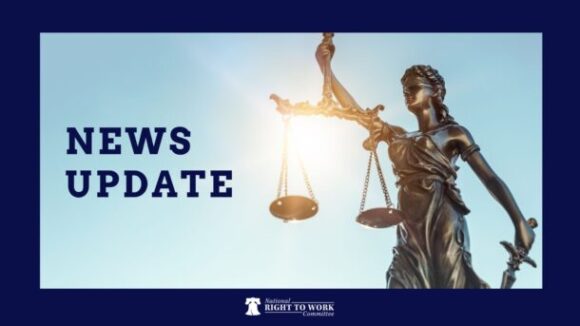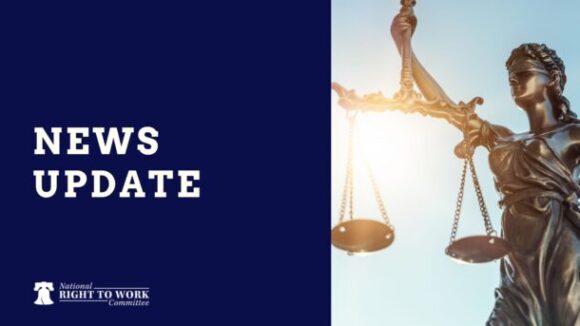[stream provider=youtube flv=http%3A//www.youtube.com/watch%3Fv%3D8ia-l1RASG8 img=x:/img.youtube.com/vi/8ia-l1RASG8/0.jpg embed=false share=false width=450 height=253 dock=true controlbar=over bandwidth=high autostart=false /]
ACORN Founder Wade Rathke regarding SEIU Lawyer Craig Becker’s appointment to the five-member National Labor Relations Board once wrote:
“Thanks for a solid, President Obama!” And, “Craig Becker will no longer be a secret weapon for workers [read SEIU & AFL-CIO bosses] at the NLRB…”
Rathke is right, Becker is no secret and, according to Washington Examiner’s Mark Hemingway and the National Right to Work Legal Defense Foundation, he appears to be willing to violate ethical restrictions to help his “former employer SEIU.
From Hemingway’s 12/10/2010 story:
National Labor Relations Board member Craig Becker recused himself from a decision earlier this week that advanced organized labor’s top public policy goal, Card Check, but worries continue to grow in at least a dozen other cases before the board in which he participated despite apparent conflicts of interest for the former labor lawyer.
Becker recused himself from the case because he had written a brief supporting labor prior to joining the board.
Card Check is a bullying tool used by unions that … exposes workers to threats and actual physical intimidation by union organizers.
Becker refused to discuss the case with the Examiner or his rationale for recusals, as did a board spokesman.
Since joining the NLRB, the National Right to Work (NRTW) Foundation has filed 13 motions noting Becker’s conflict of interest in cases before the NLRB.Since joining the NLRB, the National Right to Work (NRTW) Foundation has filed 13 motions noting Becker’s conflict of interest in cases before the NLRB.
The cases from which Becker did not recuse himself involve significant issues and his former clients, including a case involving the SEIU, for which he did extensive legal work for in the past.
Becker claimed he would have no conflicts of interest in cases involving local chapters of unions whose national organizations he had represented because the former are “distinct legal entities” from the latter.
In fact, SEIU’s constitution says the national union has “jurisdiction over its affiliated bodies and all Local Unions.”
Becker also appears to be violating the Obama administration ethics pledge he signed in which he promised: “I will not for a period of two years from the date of my appointment participate in any matter involving specific parties that is directly and substantially related to my former employer or former clients, including regulations and contracts.”
Becker also refuses to hold himself to the same level of objectivity required of his fellow NLRB members, according to the foundation.
“[Becker] refuses to adopt the more stringent federal judge standard for recusal used by current NLRB Chair Wilma Liebman in cases concerning affiliates of the Teamster union, her former employer before being installed on the Board by President Bill Clinton,” the foundation said in a filing before the board.
Becker also has a long history of public criticism of NRTW, which often works on cases before the NLRB, further compromising his objectivity.
The NLRB will soon rule on another important case involving Card Check, the Lamons Gasket case, which is confusingly enough, also referred to as “the Dana decision.”
Lamons Gasket could reverse a 2007 NLRB decision also involving the Dana Corp., the AFL-CIO and UAW in which it said employees could invalidate a union that was organized through Card Check by holding a secret ballot election on the matter within 45 days of the new union’s certification.
The Right to Work group also argues that Becker denies having pre-judged attempts to overturn the 2007 Dana decision despite a long career of advocating an extreme version of forced unionism that considers secret ballot elections “profoundly undemocratic” and despite having authored an amicus brief in that case opposing granting employees the opportunity to petition for decertification of unions recognized by card check.
Becker’s brief argued the case “there is no essential difference between Card Check and secret ballots” and called the 2007 decision ‘bad labor-relations policy,” according to the Wall Street Journal.
For more information involving the legal teams invloved in the cases, visit the National Right to Work Legal Defense Foundation website.


